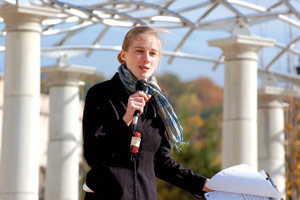This December, world leaders will convene in Copenhagen, Denmark, to continue what they started with the Kyoto Protocol in 1997: fleshing out the framework for an international agreement aimed at combating climate change. Several Asheville residents will be there, reporting what happens, providing technical expertise and trying to convince world leaders to make strong commitments to reducing greenhouse-gas emissions and slowing global warming before we reach the point of irreversible environmental damage.

UNC-Asheville junior Ellie Johnston is one of 25 "agents of change" who will represent the youth movement SUSTAIN US in Copenhagen. These young Americans, ages 19-26, will be joining other youth from around the world. She'll be blogging about the day-to-day happenings and joining demonstrations.
Asheville-based climate expert Drew Jones will also be there, working behind the scenes to help negotiators see the big picture via computer-modeling tools, including a "climate scoreboard" that will show how various actions — setting and reaching emission targets, for instance — would affect global temperatures and carbon-dioxide levels.
"If we do nothing, global temperatures could rise 4.5 degrees Celsius higher than pre-industrial levels. That's a world we can't adapt to," says Jones, program director for the Sustainability Institute. A commonly accepted target is limiting the temperature increase to 2 C, and it's already up 0.75, he explains. Another goal scientists are pushing for is 350 parts per million of carbon dioxide in the atmosphere — a level we've already exceeded.
The institute's climate scoreboard — a "widget" or interactive visual tool for expressing data — shows what happens if we do nothing, if we maintain the commitments made so far, or if we do more. "It reports the state of the global deal," says Jones. "What's the score? If we agree to one deal or the other, does it get us what we want?"
It's widely agreed something has to be done to fight climate change, Jones continues. "The real debate is, who's going to pay for it and who's going to do it?"
The United States, under the Bush administration, was the only major country not to adopt the Kyoto Protocol — despite being the world's largest single producer of greenhouse gasses and among the highest per-capita producers. The Obama administration seems to be headed into the Copenhagen conference hesitant to make strong commitments if developing countries such as China (which has since overtaken the United States as the largest producer) and India don't do likewise. Meanwhile, those countries counter that the U.S. has to take the lead. Looking at the signs of stalemate, bluster and opposition in the talks that have lead up to Copenhagen, such as the African delegations walking out to protest the lack of commitments offered by industrialized countries at a November conference in Barcelona, Spain, Johnston acknowledges, "It's hard to know how much influence we'll have."
Nonetheless, the SUSTAIN US contingent will use social media to spread the word about the negotiations as they unfold in Copenhagen. "We'll react to developments there, taking pictures and writing blogs and communicating what's going on via Twitter and Facebook," says Johnston.
The group will also do some old-fashioned demonstrating, making and holding up banners urging world leaders to take action on climate issues. The commitments made — or the opportunities missed — in Copenhagen "will have effects that will be perpetuated onto my generation and the generations after me," says Johnston, who co-chairs UNCA's Active Students for a Healthy Environment and founded the North Carolina Youth Climate Coalition.
"Copenhagen [is] a huge opportunity to see how international decisions are made and how the process works," she continues, expressing excitement about "being able to express my concerns about climate change in an international forum."

Jones has a more inside track. The institute and its partners, including MIT and Ventana Systems, are offering the climate-change scoreboard to everyone, with the hope that all the negotiating countries will be on the same page when it comes to modeling the variables. The U.S. State Department is using the tool that's behind the widget: a climate simulation called "Climate Rapid Overview and Decision Support."
"What happened in Kyoto, in part, was that everyone used their own numbers, and the numbers didn't add up to anything," says Jones. The commitments to carbon-dioxide limits made then were weak, he argues. The U.S. didn't sign the Kyoto Protocol and to date hasn't made any emission commitments. We're far from dealing effectively with climate-change issues, he argues. Jones sees the climate scoreboard as a unique way to pressure American legislators to get in the game and adopt our own targets for reduced emissions.
What makes this year's conference especially relevant to Asheville is the convergence here of the scientific community — the National Climatic Data Center is headquartered in town — and the media artists "who know how to take data and make it beautiful." In developing the widget, the Institute partnered with a local designer, and much of the work on the underlying simulation tool has been done here too, Jones mentions. "That's so Asheville!" he says.
Behind the politicians, Jones continues, are the analysts and scientists who'll be working to figure out what it will take to stabilize the planet and stop, if not reverse, global warming and other potentially devastating effects of climate change. "I want those negotiators to have a shared vision and a shared understanding. For all of us to talk deeply about what we've got to do — that's exciting to me."
For more information about C-ROADS and the Sustainability Institute's work, go to sustainer.org. For more information about the Agents of Change, visit sustainus.org. For news about the COP15 or Copenhagen conference, go to en.cop15.dk/.
You can help Johnston fund her trip by clicking on the donation box on the right-hand side of the SUSTAIN US home page.
Margaret Williams can be reached at mvwilliams@mountainx.com or at 251-1333, ext. 152.



Before you comment
The comments section is here to provide a platform for civil dialogue on the issues we face together as a local community. Xpress is committed to offering this platform for all voices, but when the tone of the discussion gets nasty or strays off topic, we believe many people choose not to participate. Xpress editors are determined to moderate comments to ensure a constructive interchange is maintained. All comments judged not to be in keeping with the spirit of civil discourse will be removed and repeat violators will be banned. See here for our terms of service. Thank you for being part of this effort to promote respectful discussion.